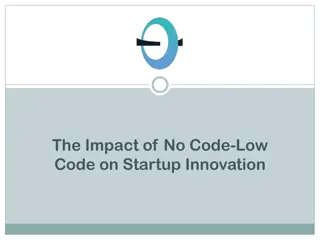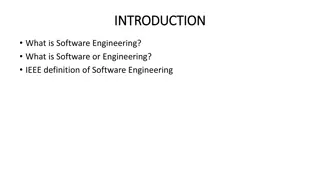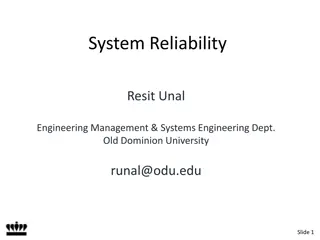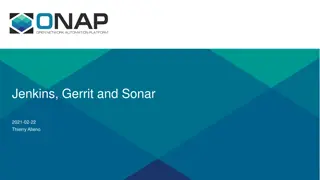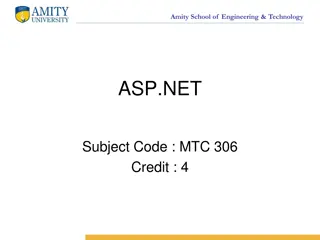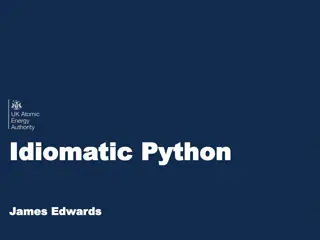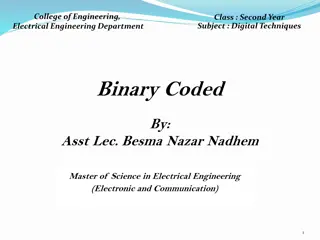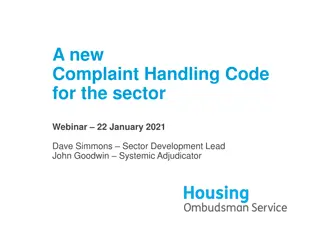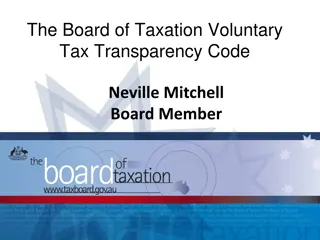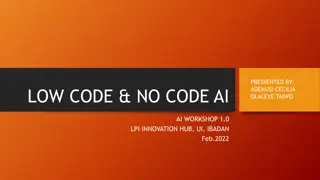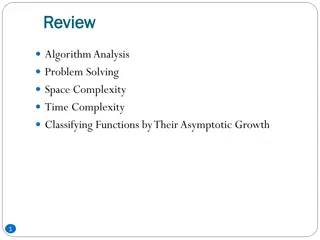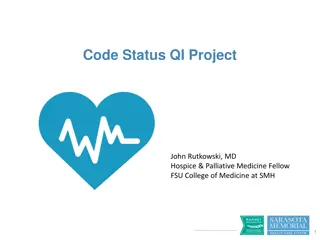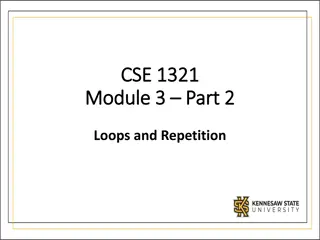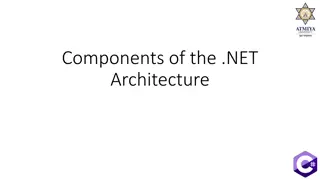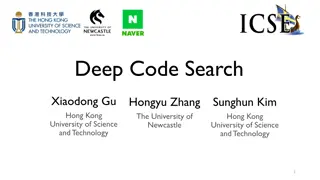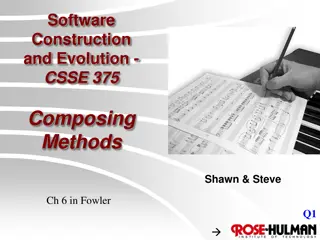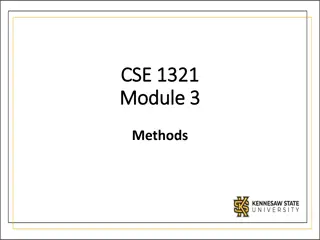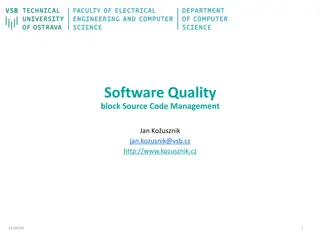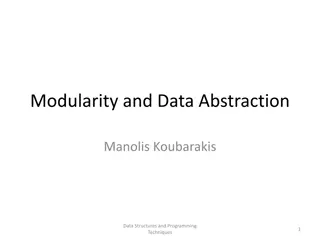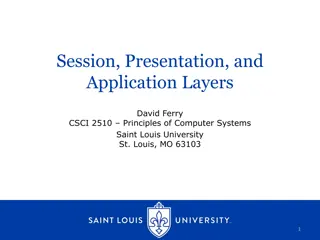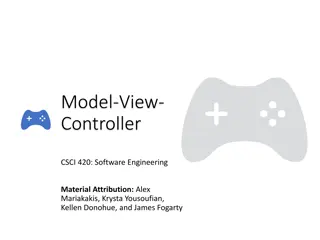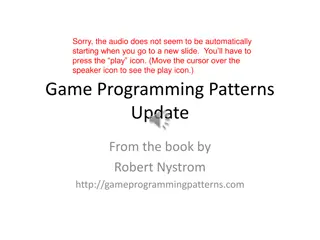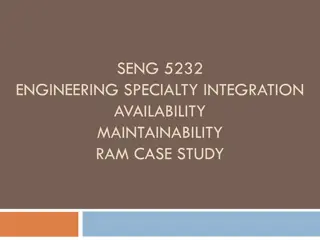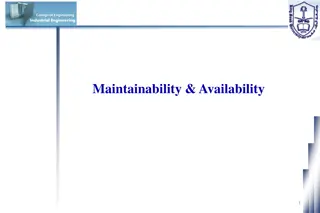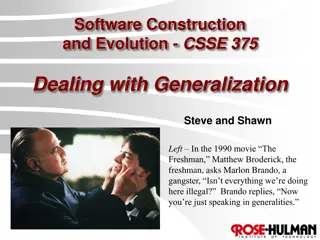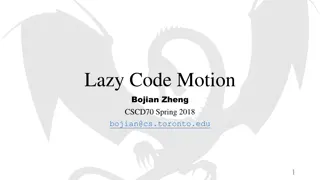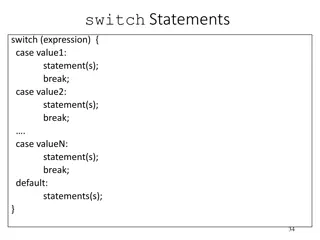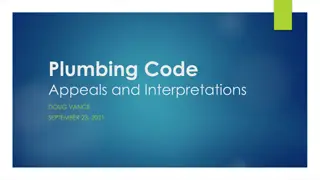The Impact of No Code-Low Code on Startup Innovation
In the vibrant world of startups, innovation is the cornerstone of success. As these businesses aim to carve out their niches, they often face a common hurdle: the extensive resources required for traditional software development. However, the emergence of low code no code (LCNC) platforms is revolu
2 views • 12 slides
Understanding Software Engineering: Concepts and Characteristics
Software engineering involves the application of scientific principles and methods to develop efficient, reliable software products. The need for software engineering arises due to factors like large software size, scalability, cost concerns, dynamic nature, and quality management. Good software exh
1 views • 25 slides
Understanding System Reliability in Engineering
System Reliability in Science/Engineering involves understanding how products/systems work, as well as the ways they fail and the effects of failures. Reliability is the probability that a system will perform as expected under given conditions and play a crucial role in the design phase to mitigate
0 views • 19 slides
Improving Code Analysis Workflow with Jenkins, Sonar, and Gerrit
Enhance code analysis processes by analyzing source code before merging, enabling analysis in branches, and triggering Jenkins jobs. Sonar.cloud provides options to analyze branches using Maven build, while the proposal suggests using Jenkins plugin for code review. Addressing challenges with Gerrit
1 views • 12 slides
Introduction to ASP.NET at Amity School of Engineering & Technology
ASP.NET is a specification by Microsoft for creating dynamic web applications, websites, and services. It offers benefits like component-based development, event-driven architecture, and extensible architecture. Amity School of Engineering & Technology emphasizes separate visualization from business
0 views • 16 slides
Mastering Idiomatic Python Programming Techniques
Idioms in Python, whether in natural language or programming, are expressions that simplify tasks and enhance code readability and maintainability. Using idioms in coding can also facilitate peer review. While not mandatory, learning idioms through practice, reading good source code, and self-review
0 views • 40 slides
Understanding Dependency Injection Principles in Software Development
Explore the concept of Dependency Injection, its importance in decoupling code modules, SOLID principles, and why it's crucial for maintainability, flexibility, and testability in software development.
0 views • 23 slides
Understanding Binary Coded Decimal (BCD) and Excess-3 Code
Binary Coded Decimal (BCD) is a binary code used to represent decimal numbers, with the popular 8421 BCD code and its conversion process explained. Additionally, Excess-3 Code, another BCD code, is detailed with an example of finding its code for a given decimal number. Different BCD codes like 4221
0 views • 11 slides
A New Complaint Handling Code for the Sector - Webinar Highlights
This webinar discusses the introduction of a new Complaint Handling Code for the sector, aiming to address issues in social housing complaint processes. It covers key points, the background leading to the code's development, the Ombudsman's experience, and the code's aims and framework towards high-
0 views • 14 slides
The Board of Taxation Voluntary Tax Transparency Code Overview
The Board of Taxation developed a voluntary Tax Transparency Code to address community concerns and promote greater tax transparency among large businesses. The Code outlines recommended disclosures for both large and medium businesses, encouraging adoption of higher disclosure standards. Internatio
0 views • 20 slides
Simplifying AI Development with Low-Code and No-Code Platforms
Explore the world of low-code and no-code AI development platforms, empowering experts to create applications with ease. Learn about the benefits, tools, and components of these innovative platforms, and discover popular AI tools for no-code development. Accelerate your digital transformation journe
0 views • 11 slides
Understanding Pseudo Code and Flow Charts for Algorithm Analysis
Explore the concepts of pseudo code and flow charts for analyzing algorithms, problem-solving, and understanding space and time complexity. Learn about basic elements of pseudo code, assigning operations, and writing effective pseudo code statements in a clear and structured manner. Discover the imp
0 views • 26 slides
Transitioning EPICS Base to Modern C++ for Enhanced Performance
Enhance your EPICS Base system by utilizing modern C++ features such as strict type checking, zero-cost abstraction, templates, and more. Learn the motivations behind switching to C++ and explore the new C++ features for improved efficiency and maintainability.
1 views • 16 slides
Understanding Knockout JS: A Powerful JavaScript Library for Dynamic UIs
Knockout JS is a JavaScript library developed by Steve Sanderson that facilitates the creation of dynamic and responsive user interfaces. It is based on the MVVM design pattern, which separates the data model, view model, and view to enhance maintainability and reduce errors. The library's observabl
3 views • 20 slides
Enhancing Code Status Discussions in End-of-Life Care: A Quality Improvement Project
This project led by Dr. John Rutkowski aims to reduce inappropriate interventions for patients with DNR or Modified Code Status by implementing an improved code status documentation system. Data analysis reveals a need for better documentation practices, and survey responses highlight various challe
0 views • 18 slides
Understanding Loops and Repetition in Programming
Loops in programming allow us to execute a set of statements multiple times based on certain conditions. This content covers the motivation behind using loops, different types of loops like while and for loops, criteria for choosing the right loop, and the syntax and logic of while loops. By underst
0 views • 69 slides
Understanding Total Quality Management (TQM) and Dimensions of Quality
Total Quality Management (TQM) is customer-oriented, aiming to achieve customer delight through systematic quality improvements. Quality, defined by experts like Juran and ISO, focuses on fitness for use and meeting customer needs. The concept includes dimensions like Product Quality (Functionality,
0 views • 30 slides
The Importance of Naming in Software Development
Effective naming of variables, functions, and concepts is crucial in software development to enhance readability, maintainability, and communication among team members and stakeholders. This article stresses the significance of thoughtful naming conventions, providing insights into the impact of nam
0 views • 50 slides
Understanding the .NET Architecture Components
The .NET architecture comprises various key components such as the Common Language Specification, Code Manager, Managed Code, Unmanaged Code, and Native Code. These components play crucial roles in the development and execution of applications within the .NET framework. Managed code is executed by t
0 views • 21 slides
Challenges in Code Search: Understanding, Matching, and Retrieval
Programming can be challenging due to the lack of experience and unfamiliar libraries. Code search engines struggle with representing complex tasks, while information retrieval techniques aim to bridge the gap between source code and natural language queries. The mismatch between high-level intent a
0 views • 21 slides
Refactoring Methods for Composing Code in Software Construction
Explore the key concepts of refactoring methods for composing code in software development. Learn about techniques such as Extract Method and how they can improve code readability, maintainability, and reusability. Understand the process of creating well-named methods and optimizing code structure f
0 views • 23 slides
Understanding the Importance of Functions in Programming
Functions in programming serve as a logical grouping of statements, allowing for reusable chunks of code that can be written once and called multiple times. By using functions, developers can work at a higher level of abstraction, reduce complexity, and minimize the code size. Functions eliminate th
0 views • 40 slides
Software Quality and Source Code Management Best Practices
Effective source code management is crucial for software quality assurance. This involves locking down code, baselining milestones, managing code variants, and ensuring traceability. Software Configuration Management (SCM) is key, encompassing configuration items and core concepts like creating base
0 views • 34 slides
Understanding Modularity and Data Abstraction in Programming
Learn about the importance of procedural abstraction, information hiding, modules, and abstract datatypes in programming. Discover how these concepts help in structuring large programs, improving maintainability, and enhancing data organization and operation control.
0 views • 56 slides
Understanding the Layers of Computer Systems Architecture
Explore the intricacies and responsibilities of the Session, Presentation, and Application layers in computer systems architecture. From user identification to data presentation and network programming, delve into the critical functions and challenges faced at each layer. Gain insights into the impo
0 views • 10 slides
Workshop on Maintaining PIP-II within the Accelerator Complex - Operational Requirements and Interfaces
This workshop, held on July 15, 2021, focuses on maintaining the PIP-II within the Accelerator Complex through discussions on uptime, availability, maintainability, and operability requirements. The event covers various presentations on system interfaces, maintenance strategies, and operational expe
0 views • 4 slides
Multi-Label Code Smell Detection with Hybrid Model based on Deep Learning
Code smells indicate code quality problems and the need for refactoring. This paper introduces a hybrid model for multi-label code smell detection using deep learning, achieving better results on Java projects from Github. The model extracts multi-level code representation and applies deep learning
0 views • 10 slides
Understanding MVC Pattern in Software Engineering
MVC (Model-View-Controller) is a classic design pattern used in software engineering to manage data-driven user applications. It separates the application into three interconnected components - Model, View, and Controller. Each component has specific tasks to handle, leading to organized code, ease
0 views • 17 slides
Understanding Stronger vs. Weaker in Programming Concepts
Exploring the differences between stronger and weaker specifications in programming, along with insights on subtypes, subclasses, typing, generics, and method declarations. Learn how to differentiate, apply, and leverage these key programming concepts effectively to enhance code quality and maintain
0 views • 11 slides
Overview of CAIN Particle Tracking Code for High-Energy Colliders
CAIN is a particle tracking code used for high-energy collider simulations since 1984. Initially named ABEL, it evolved to include beam-laser interactions for gamma-gamma colliders. The code, written in FORTRAN 90, handles beam-beam and external fields, with a structure where all particles are store
0 views • 17 slides
Improving Game Programming Patterns for Better Maintenance
In game development, synchronization with the render cycle is crucial to ensure smooth movement and user experience. The current approach of handling individual entities in the main game loop can lead to a cluttered and difficult-to-maintain codebase. By implementing the Update Pattern, where each e
0 views • 14 slides
Understanding Availability and Maintainability in Engineering
Availability and maintainability are crucial aspects in engineering, defining the system's operable state and its ability to fulfill missions. Availability is the probability of the system being operational when called for, contingent on factors such as failure occurrence, maintenance frequency, and
0 views • 74 slides
Industrial Engineering Maintainability & Availability Overview
Industrial engineering maintainability focuses on the built-in characteristics of equipment design to ensure efficient maintenance processes, minimize downtime, and lower maintenance costs. Key measures like Mean Time To Repair (MTTR) and Mean Preventive Maintenance Time (MPMT) are used for analysis
0 views • 16 slides
Dealing with Generalization in Software Construction
Explore methods to address common code smells related to generalization in software development, such as dealing with duplicate code, inappropriate intimacy, and large classes. Learn how to apply techniques like Pull Up Field, Pull Up Method, and Extract Subclass to improve your code structure and m
0 views • 20 slides
Lazy Code Motion and Partial Redundancy Elimination in Optimizing Compiler
Lazy code motion, partial redundancy elimination, common subexpression elimination, and loop invariant code motion are optimization techniques used in compilers to improve code efficiency by eliminating redundant computations and moving code blocks to optimize performance. These techniques aim to de
0 views • 35 slides
Design Patterns Overview and Application Scenarios
Explore various design patterns such as Creational, Structural, and Behavioral patterns, including Adapter, Decorator, Proxy, and more. Learn how to apply these patterns to solve common software design challenges and improve code flexibility and maintainability.
0 views • 16 slides
Understanding Switch Statements in Programming
Switch statements are a powerful feature in programming that allow for efficient branching based on the value of an expression. This content explains the syntax, rules, and usage of switch statements, along with examples and best practices. Learn how to effectively implement switch statements in you
0 views • 15 slides
Unleash the Power of JavaScript Slot Machine Code for Your Online Casino (1)
Learn how to create captivating online slot machines with JavaScript Slot Machine Code, Casino game code, Casino game HTML code, HTML5 casino games source code, Slot machine JavaScript for your platform.\n\nKnow more>>\/\/ \/javascript-slot-machine-c
0 views • 4 slides
Plumbing Code Appeals and Interpretations Overview
This document provides information on the agenda, upcoming professional development events, Building Code Appeal Board, Appeal Board decisions, Code Interpretation Committee, code interpretations, and final thoughts related to plumbing code appeals and interpretations. It covers the appeal process,
0 views • 8 slides
Insights on Reliability, Availability, Maintainability in Engineering
Explore key concepts from Wasson's chapter on Reliability, Availability, and Maintainability, including compensating provisions and latent defects. Get ready for an introduction to reliability and stay tuned for strategies to manage design for R-A-M. Don't forget to study the Bathtub Curve!
0 views • 4 slides
